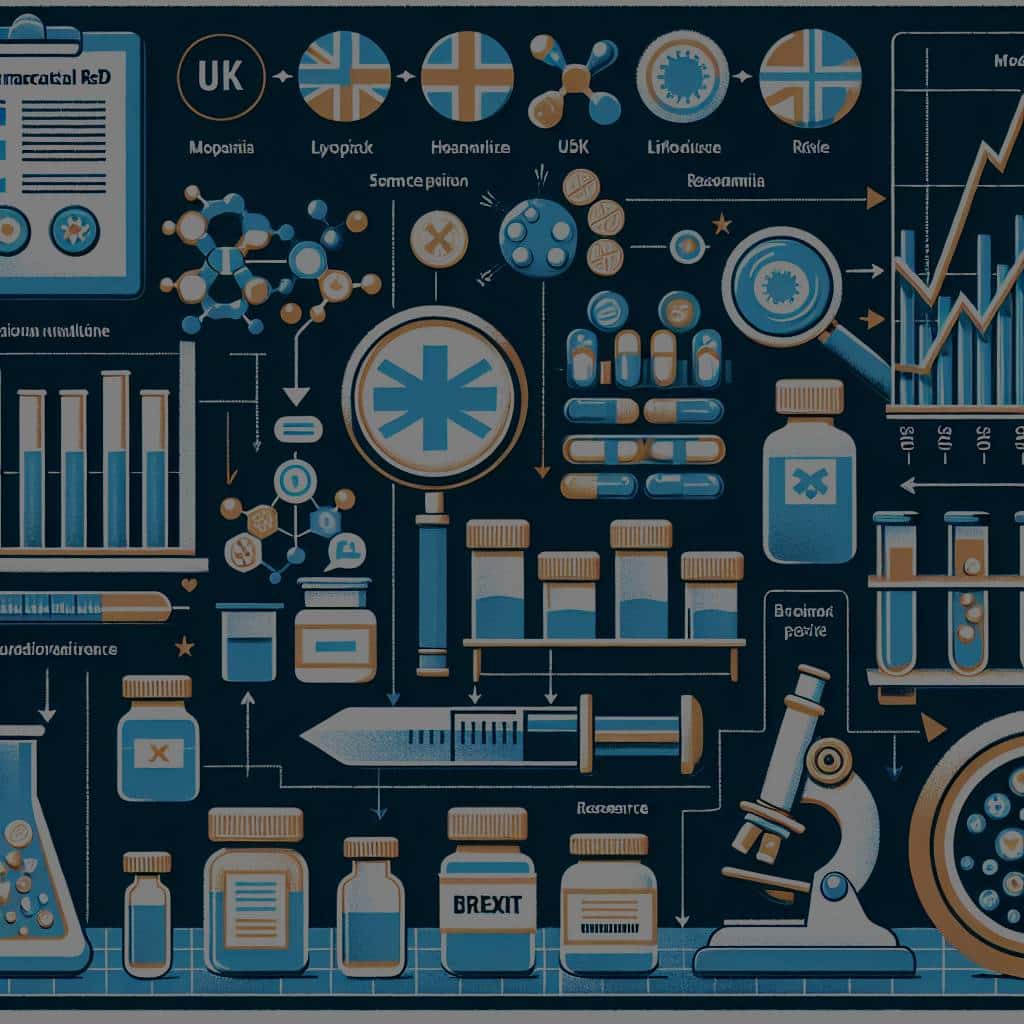Brexit has far-reaching implications for various sectors in the UK, and one area that has been significantly affected is the pharmaceutical industry. The UK’s pharmaceutical sector is a critical component of its economy, contributing over £30 billion each year and employing over 500,000 people. In a post-Brexit era, the industry faces a series of challenges and opportunities. In this article, we will explore the impacts of Brexit on pharmaceutical Research and Development (R&D) in the UK. The impact will be discussed under five main headings: Health Authorisation, Free Trade, Access to Medicines, Market Supply, and Employment.
Health Authorisation
Before diving into the impacts of Brexit on health authorisation, it’s important to understand the role of the European Medicines Agency (EMA). Prior to Brexit, this agency was responsible for the scientific evaluation, supervision, and monitoring of medicines in the European Union (EU). However, with Brexit, the UK’s Medicines and Healthcare products Regulatory Agency (MHRA) has taken over the responsibilities that were previously held by the EMA.
Additional reading : What Are the Best Practices for Mobile Payment Security for UK Consumers?
This transition has implications for the pharmaceutical industry’s R&D. For instance, the UK will now have to develop their unique standards for approving medicines, which could lead to delays and additional costs for pharmaceutical companies. Furthermore, firms will need to navigate a new regulatory landscape in the UK, which could be time-consuming and require additional resources.
The withdrawal from the EMA also means that the MHRA will no longer have access to the EU’s data network. This loss of data sharing capabilities could limit the MHRA’s ability to make informed decisions about the safety and efficacy of new medicines.
Also to see : How to Build a Cybersecurity Awareness Program in Your UK Business?
Free Trade
Another critical area where Brexit affects the pharmaceutical industry is in terms of trade. The UK’s withdrawal from the EU has disrupted the free trade agreements that were previously in place. These changes could have serious repercussions for the pharmaceutical industry, which heavily relies on the free movement of goods and services.
Indeed, the industry’s R&D operations often involve cross-border collaborations, which are now more difficult due to Brexit. For example, clinical trials often involve multiple sites across different countries. The added complexities and costs of moving goods and services across borders could slow down R&D activities and increase their costs.
Moreover, the UK may face higher tariffs on pharmaceutical imports and exports, which could further strain the industry. While the UK has expressed its intention to negotiate new trade deals post-Brexit, it is still uncertain how these will compare to the arrangements that were in place within the EU.
Access to Medicines
Brexit also has implications for the UK’s access to new medicines. The EMA has a centralised authorisation process, meaning that pharmaceutical companies only need to get their products approved once for them to be marketed across all EU member countries. Now that the UK has left the EU, it is no longer part of this efficient system.
The potential delay in access to new medicines could impact patient health, as it may take longer for new treatments to reach the market. Furthermore, pharmaceutical companies may decide that it is not economically viable to introduce certain medicines to the UK market, especially if the market is smaller or the regulatory hurdles are higher.
Market Supply
The pharmaceutical market supply chain is another area that could be significantly affected by Brexit. Many pharmaceutical products are manufactured in one country, packaged in another, and distributed across multiple other countries. This intricate and highly coordinated supply chain could be disrupted due to the additional customs checks and border controls that Brexit entails.
A disruption in the supply chain could lead to delays in the delivery of critical medicines, negatively impacting patient care. It could also increase costs for pharmaceutical companies, which may, in turn, lead to higher prices for medicines.
Employment
Finally, Brexit could also have significant impacts on employment within the pharmaceutical industry. Many pharmaceutical companies in the UK employ a diverse workforce, with many employees coming from other EU countries. However, Brexit could make the UK less attractive to these skilled workers, potentially leading to labour shortages in the industry.
In addition, new immigration rules could make it more difficult for pharmaceutical companies to recruit from the EU, potentially hindering R&D activities. Lastly, the loss of EU funding for research may mean fewer opportunities for research roles within the industry.
In conclusion, while it’s clear that Brexit presents a range of challenges for the UK’s pharmaceutical industry, it also offers opportunities for the country to shape its policies and regulations to foster innovation and growth. Only time will tell how the industry adapts to these changes and what the long-term impacts will be.
Pharmaceuticals Supply and Brexit
The UK’s exit from the European Union has significantly impacted the supply of pharmaceuticals, as the sector heavily relies on complex, cross-border supply chains. The pharmaceutical supply chain involves numerous stages, from the production of raw materials to the manufacturing of medicines and their subsequent distribution.
The nature of this supply chain means that a delay or disruption at any point can have a knock-on effect on the entire system. With Brexit, the introduction of customs checks and border controls has introduced additional complexities to this process. As a result, pharmaceutical companies operating in the UK have to navigate these additional layers of bureaucracy, which can slow down the supply of medicines.
Moreover, the UK pharmaceutical sector also heavily relies on the import of raw materials from EU countries. Following Brexit, these imports could be subject to additional customs checks and tariffs, which could lead to increased costs and delays in the delivery of medicines.
Another concern is the impact of Brexit on the supply of medicines to Northern Ireland, which remains in the EU’s single market for goods. This unique situation creates additional complexities for pharmaceutical companies supplying medicines to Northern Ireland, as they now have to abide by both UK and EU regulations.
Ultimately, the implications of Brexit on the pharmaceutical supply chain could lead to increased costs for pharmaceutical companies, which could then translate into higher prices for medicines for patients in the UK.
The Future for UK Pharmaceutical R&D after Brexit
While Brexit has undoubtedly posed significant challenges for the UK’s pharmaceutical industry, it may also present certain opportunities. For instance, the UK can now tailor its own pharmaceutical regulations and policies to foster innovation and growth in the sector.
One potential area of opportunity is in clinical trials. Post-Brexit, the UK is no longer bound by EU regulations around clinical trials, which could allow the country to introduce more flexible or innovative approaches. This could potentially make the UK a more attractive location for pharmaceutical companies to conduct their clinical trials.
Furthermore, the UK could also leverage its robust scientific research base to attract more pharmaceutical R&D. The Google Scholar and PubMed Crossref data suggest that the country has a strong track record in pharmaceutical research. By offering incentives or creating a favourable policy environment, the UK could position itself as a leading hub for pharmaceutical R&D.
Brexit also allows the UK to negotiate its own trade deals, which could potentially open up new markets for the country’s pharmaceutical products. While it’s unclear how these negotiations will pan out, the possibility of accessing new markets could be a boon for the UK’s pharmaceutical industry.
While the challenges posed by Brexit are real and significant, the opportunities are potentially transformative. The key is to navigate the transition smoothly, ensuring the continued availability of medicines for UK patients, while seizing the opportunities to foster innovation and growth in the industry.
Conclusion
Brexit has had wide-ranging impacts on the UK’s pharmaceutical industry, affecting everything from health authorisation to free trade, access to medicines, market supply, and employment. While these challenges are daunting, the post-Brexit landscape also offers opportunities for the UK to shape its own destiny in the pharmaceutical sector.
Indeed, the UK now has the ability to tailor its regulations and policies to foster innovation and growth in the sector. Leveraging its strong scientific research base and the potential to negotiate new trade deals, the UK could position itself as a leading hub for pharmaceutical R&D post-Brexit.
However, navigating this transition smoothly will require careful planning and coordination among all stakeholders. Only time will tell how the UK’s pharmaceutical industry adapts to these changes and what the long-term impacts of Brexit will be. What remains certain is that the health and wellbeing of UK patients should remain a top priority throughout this process.






